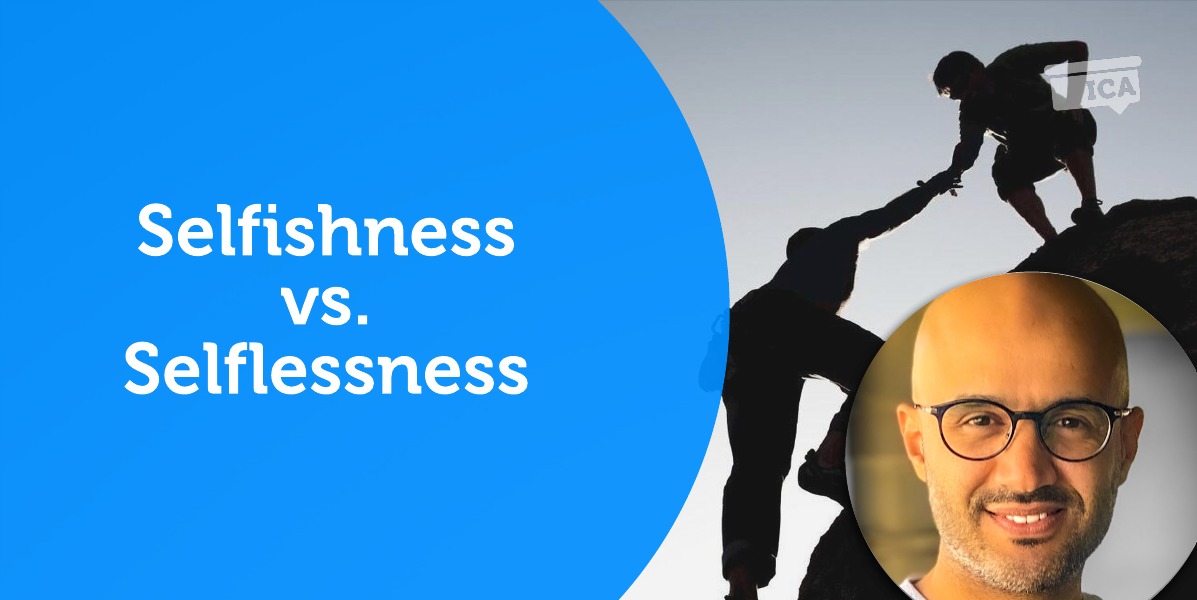A Coaching Power Tool Created by AbdulRahman Alharbi
(Career Coach, SAUDI ARABIA)
Introduction
When I’m asked about selfishness, I think of someone who is like “me first, then others” or someone who consistently asks him/ herself “what is in it for me?” when faced with any situation. Selfishness and selflessness are two ends of the habits of giving and taking.
As per Cambridge Dictionary(SELFISH | meaning in the Cambridge English Dictionary, 2020), you are selfish when “caring only about what you want or need without any thought for the needs or wishes of other people”. Selfishness is perceived as a bad habit; for example, it is not perceived well in couple relationships, in teamwork activities, or in trading operations. On the other hand, you are selfless when “caring more about other people’s needs and interests than about your own” according to Cambridge Dictionary (SELFLESS | meaning in the Cambridge English Dictionary, 2020). It’s perceived as a well-behaving act in for example the situations shared above.
Reasons for selfishness
According to GoodTherapy(Selfishness, 2015), mental health, illness, and personality disorders are key drivers for selfishness. Past experiences as well greatly affect how a person approaches similar future situations. The following imaginary situations are examples:
Passing through such situations lead to forming related self-limiting beliefs. These beliefs then drive behaving in selfish ways caused by automatic thoughts i.e. “no one will take credit but me” and “myself, my aspirations than others’”.
Reasons for selflessness
There’re no specific reasons for being consistently selfless, however; a close opinion is that it has to do with one’s values. Someone who is consistently vulnerable, helpful, putting others’ needs before his/her, must have specific values that drive his/ her behavior.
Good or Bad?
The examples of situations of selfishness and selflessness are never-ending. The argument is that which act is right. Being selfish, selfless, or both? Well, it depends on the context of the concerned situation, and on the consequences of that act in that situation. Every one of us has been selfish in some situations and selfless in others. To answer the question of good or bad, selfishness and selflessness as absolute acts are neither good nor bad unless someone is hurt. Someone who is consistently looking after his own personal growth in terms of skills and competencies is considered selfish, as a standalone behavior, it is considered good behaving this way, however, if this person is behaving this way on the expense of his/ her job responsibilities, then it’s considered as bad behavior. Someone who is consistently dedicating his/ her time for charity activities, acting as a philanthropist is considered a good act, however; if it’s done at the expense of the family time, for example, it is considered as bad behavior.
The bottom line, there’s a need to avoid judgment here, to shift perspective, to reframe the situation, and to look at the bigger picture. Both behaviors can be good and bad, it is the consequence of this behavior what makes the case for categorizing the behavior as good or bad.
Self-Application
Self-awareness is key to manage others’ perceptions and expectations. In particular, values clarification and discovering one’s underlying beliefs are a few first steps to create this awareness. Values clarification is to be self-aware of what you value, what drives your behavior, what motivates you to continue doing what you are doing. It starts by reflecting on situations of joy, fear, happiness…etc. and asking; what was happening? What was the problem? How did I behave? And Why? What did I feel then? If it will happen again, how will I behave? Reflecting on these questions supports the clarification process and results in identifying a number of values that are important for you. Once you are aware of what is important to you, ensure people around you, family, friends, and coworkers, are aware of what is important to you. This helps in not judging your behaviors, and in giving you the benefit of the doubt. Self-awareness is also about understanding the context and consequences of our actions.
Coaching Application
Support your client to explore and reflect on recent situations of conflict. Questions like what, when, who, how, and why are helpful for the client during the exploration process. The key here is creating awareness. Support the client to explore how his/ her act was perceived, and how it should it be. Support the client to step back and look at other pictures, what individual and group intents are and what might cause conflict, and what to do then. Help the client to discover other perspectives, to avoid judgment at any cost, this is to avoid describing a selfish/ selfless acts as good or bad.
References
Dictionary.cambridge.org. 2020. SELFISH | Meaning In The Cambridge English Dictionary. [online] Available at: <https://dictionary.cambridge.org/dictionary/english/selfish> [Accessed 23 March 2020].
Dictionary.cambridge.org. 2020. SELFLESS | Meaning In The Cambridge English Dictionary. [online] Available at: <https://dictionary.cambridge.org/dictionary/english/selfless> [Accessed 23 March 2020].
GoodTherapy.org Therapy Blog. 2015. Selfishness. [online] Available at: <https://www.goodtherapy.org/blog/psychpedia/selfishness> [Accessed 23 March 2020].
